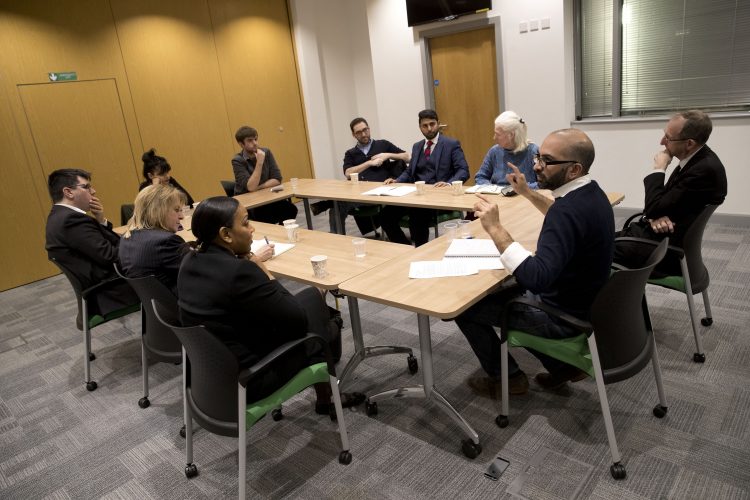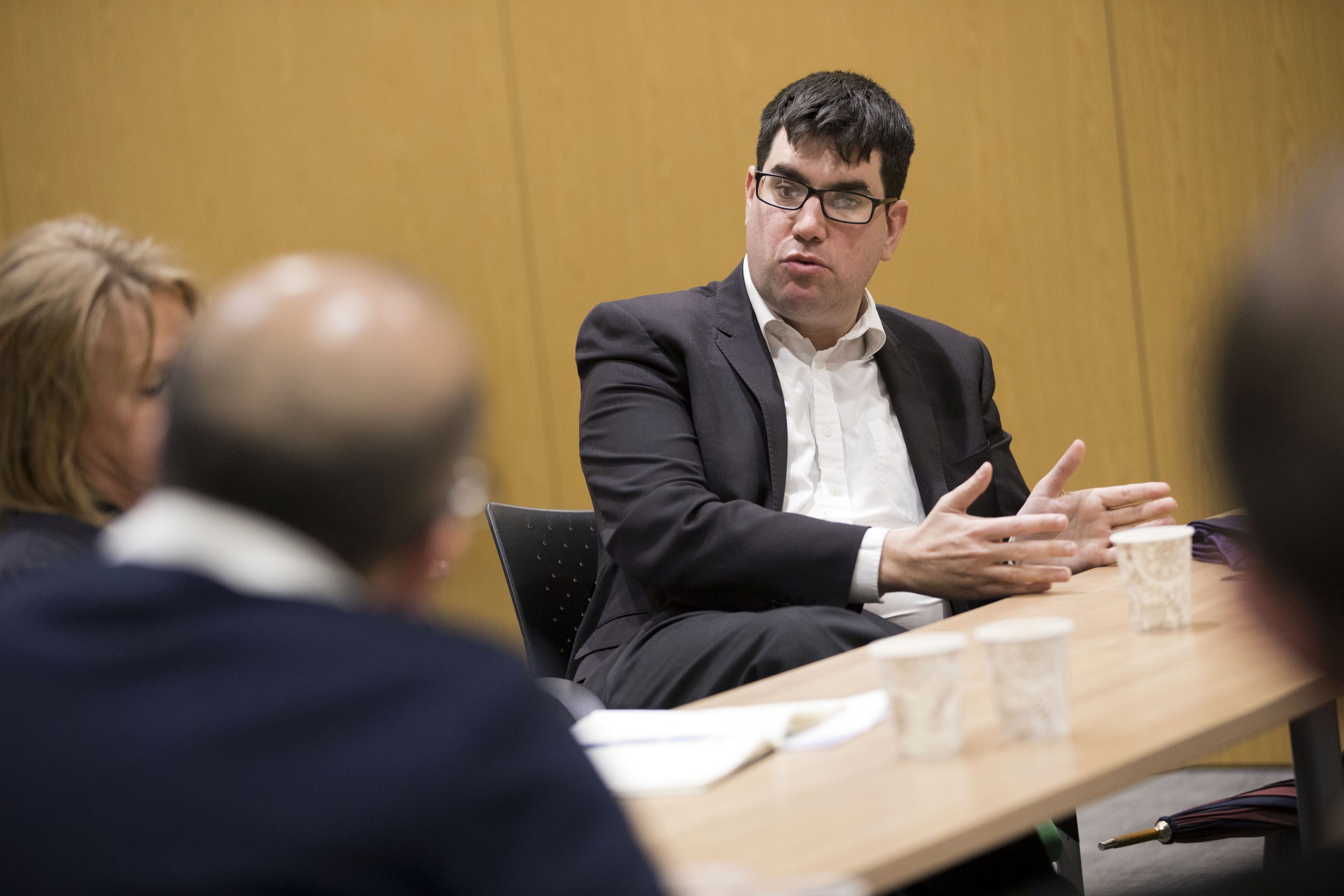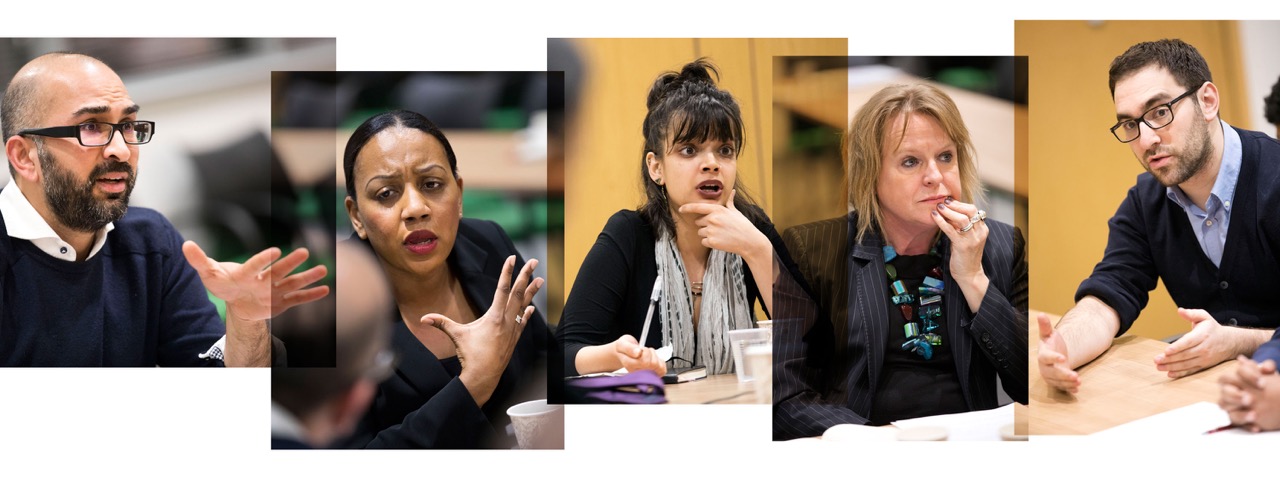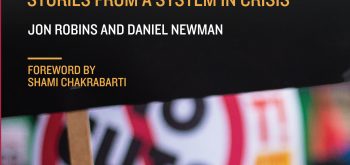Earlier this year the Justice Alliance hosted a roundtable discussion with access to justice warriors, thinkers and doers to talk about why we need legal aid now more than ever. Report by Will Bordell and photos by Jess Hurd
The system of publicly funded law has often been called ‘the forgotten pillar of the welfare state’. ‘It is because we have lost that idea that it has been easy for successive governments to degrade legal aid,’ said Richard Burgon, shadow justice secretary. The MP for Leeds East was talking at a specially convened roundtable for Proof magazine.
Whilst the public instinctively values schools and hospitals, rallying around the right to a good education and decent healthcare, the notion of a right to ‘access to justice’ is far less clearly defined in the collective consciousness.
This was one of the themes of the Justice Alliance/Justice Gap event chaired by Shiv Malik, Guardian journalist and co-author of Jilted Generation: How Britain Has Bankrupted ItsYouth. The event took place at Unite the Union’s head office earlier this year. ‘Even the Tories wouldn’t dare to openly disparage the NHS because there would be such a massive outcry,’ said Vakas Hussain, co-chair of the Rotherham 12 Defence Campaign.
A full version of this article appear in the latest issue of Proof Life in the Justice Gap: Why legal aid matters.
Proof is the print magazine of the Justice Gap. The latest issue features contributions from Helena Kennedy QC, Martha Spurrier, Lord Tony Gifford QC as well as journalists including the Guardian’s David Conn and Rebecca Omonira-Oyekanmi who has written an extended article reporting from the frontline of the legal aid cuts. The cover and Rebecca’s article is illustrated by the award-winning artist Simon Pemberton.
The panel was chaired by Shiv Malik, Guardian journalist and co-author of Jilted Generation: How Britain Has Bankrupted Its Youth, and comprised Miranda Grell from Hackney Community Law Centre and Haringey Law Centre; Deborah Coles from INQUEST; Richard Burgon, shadow justice secretary and MP for Leeds East; Shareefa Panchbhaya from Y-Stop, a project run by young people on police stop-and-search; Tom Nunn from Bail for Immigration Detainees (BID); Sam Genen is a solicitor at Deighton Pierce Glynn and formerly a consultant with the Centre for Criminal Appeals; Vakas Hussain from the Rotherham 12 defence campaign, supporting protestors who resisted far-right extremists after attending an anti- racism protest in Rotherham and who were cleared of violent disorder; Gloria Morrison from Joint Enterprise: Not Guilty by Association (JENGbA); and Greg Powell from the London Criminal Courts Solicitors’ Association.
ORDER HERE.

Justice Alliance/Justice Gap PROOF MAGAZINE roundtable. Photos by Jess Hurd
Vakas Hussain, a trainee barrister, made the case for reframing the debate around legal aid. ‘The argument is a microcosm of broader British society,’ he argued. Many people dismiss legal aid, associating it with ‘giving criminals a free rein’ or allowing foreigners and ‘benefits scroungers’ to game the system. ‘As advocates, lawyers and campaigners, we have to re-emphasise to people the importance of having a well-funded legal system,’ he added.
A broad-based coalition of lawyers and non-lawyers, the Justice Alliance aims to take the argument that legal aid matters to the widest possible audience. ‘We’ve never viewed the law as a panacea,’ said non-lawyer Deborah Coles, director of INQUEST. ‘It’s just one strategy. It’s about how you change the mind-set, and how you challenge the narrative.’
Greg Powell, veteran defence lawyer and president of the London Criminal Courts Solicitors’ Association, argued that the lesson to learn from ‘the great disaster’ of LASPO was that legal aid cuts must be opposed with direct action. ‘The moral case that people need access to justice should work,’ he said, ‘but it doesn’t.’
Last year the former Lord Chancellor, Michael Gove dropped radical plans to reform the legal defence market through competitive tendering. His proposals would have seen many long-practising firms go to the wall. The U-turn followed industrial action and more than 100 procurement law challenges by those affected.
‘Direct action is necessary,’ Richard Burgon agreed. ‘People make the mistake [of thinking] that the law is somehow neutral. We need campaigners who are making the case for access to justice.’ ‘What works is if you manage to stop the courts from operating, if you embarrass the government,’ said Greg Powell.
A sea of unmet need
Shiv Malik asked the veteran defence lawyer to put the LASPO cuts into context. ‘The accidental by-product of the expansion of legal aid was that there were numerous high street firms which offered local access and integrated services – crime, housing, immigration, personal injuries – all under the same roof,’ he said. ‘That’s important to a community because most people want to access multiple services. They could find that in a trusted firm that they had a relationship with. That was a terrific way of delivering a service.’
At one point, Powell reckoned, there were approximately 7,000 solicitors’ firms delivering legal aid. ‘There’s now around 2,000,’ he said. Cuts to the legal aid scheme from the New Labour period onwards also ‘disintegrated delivery’, creating more specialised practices that separated criminal work from civil.
Then along came LASPO. The Bach Commission on access to justice, established by the Labour party, revealed that the number of not-for-profit legal advice centres plummeted from just over 3,200 in 2005 to around 1,450 a decade later. ‘There was always great unmet need,’ said Powell. ‘Now there’s a sea of unmet need but it’s invisible. The government can act with impunity because the people that they take legal rights away from are invisible too.’
Vakas Hussain argued that restricting the debate about legal aid to a post-LASPO analysis was ‘short-sighted’. ‘Legal aid wasn’t the panacea that we make it out to be,’ he said. To have ‘a real debate on the history of legal aid and where we’ve come from’, Hussain agreed on the need to acknowledge that ‘cuts and stagnation’ began with the previous Labour government. After the election of the Coalition in 2010, the ‘carte-blanche approach’ of austerity led to ever-deepening cuts.
On the ground, the drastic impact of the cuts is clear. Miranda Grell works at ‘the last law centres standing in North London’, dividing her time between Hackney and Haringey. Since LASPO’s introduction, 11 law centres have had to shut up shop.
‘Barnet closed. Enfield closed. There’s no law centre in Waltham Forest. That’s why we’re trying to keep Haringey open,’ Grell explained. Between May and December last year, the centre had no income whatsoever. Before then, it had received a local authority grant, but in spring last year, Haringey Law Centre was one of many voluntary agencies in the North London borough to lose support. It would have closed but for the extraordinary commitment of its staff. Despite no longer receiving a salary, its manager and debt worker stayed on. At the end of last year, the City of London Solicitors’ Company agreed to fund its debt advice post for the next three years.
Hackney Community Law Centre recently acted for Julius Holgate, a double amputee with no legs who had previously been assessed ‘fit for work’ by the Department for Work and Pensions. They argued that because he had arms, he could use them to ‘climb’ stairs and so had ‘mobility’. When his Employment and Support Allowance (ESA) was cut off, he started falling into debt and had to pawn his jewellery to survive. ‘It was only when we got involved that they overturned this decision,’ said Grell.
‘We’re not funded to provide welfare advice anymore,’ she continued, since LASPO removed it from the scope of the legal aid scheme. ‘The only reason we can provide support to people like Julius is because we had to go and get grants.’ But fundraising cannot fill the void. ‘There are many Juliuses,’ she said. ‘It’s just absolutely horrendous.’

‘I don’t want our legal aid system to be run by decent people giving their time as charity’: Richard Burgon, shadow justice secretary
Doing the right thing
Last year’s Hillsborough inquest offered a rare example of bereaved families having parity of funding with the police. ‘What inquests can do when they work properly, when the families are legally aided, is hold the state to account,’ said Deborah Coles.
Theresa May, as Home Secretary, guaranteed the funding (though not legal aid) for the families of the 96 Liverpool fans who died at Hillsborough. Typically, bereaved families are forced to ‘go through an extremely intrusive, distressing means assessment’ to apply for legal support, Coles said. ‘Very often families are asked whether they have savings or significant [items of] jewellery,’ she said. ‘Our caseworkers are repeatedly talking to families who just want to opt out because they find the process so demeaning.’
By contrast, public authorities like the police are offered ‘unlimited public funds’. The Ministry of Justice perpetuates the ‘reprehensible’ myth that ‘inquests are inquisitorial and that families should be able to represent themselves,’ Coles said. Yet the state comes to court armed to the teeth with lawyers who ‘try to shut down the scrutiny.’
‘The state has all the resources it wants to put people in prison,’ remarked Gloria Morrison, ‘and then once you’re in prison and you try to appeal there’s nothing.’ Morrison is one of the driving forces behind Joint Enterprise: Not Guilty by Association (JENGbA), a campaigning organisation representing hundreds of families whose loved ones are in prison claiming to be wrongfully convicted. Under the controversial legal doctrine of joint enter- prise, juries can find defendants guilty of a killing even if they did not deliver the fatal blow.
The group’s campaigns have led to two House of Commons’ justice committee inquiries, as well as persuading the dramatist Jimmy McGovern to make a BBC film (Common) about the issue. Last year, JENGbA intervened in the Supreme Court case of R v Jogee which concluded that case law regarding joint enterprise took a wrong turn in the mid-1980s, opening up the possibility for a swathe of appeals. However at the end of last year in R v Johnson, the first batches of cases were all knocked back. ‘The more the courts are unwilling to do the right thing and follow the rule of law, the angrier we will become,’ she said.
A number of speakers expressed concerns about Chris Grayling’s 2013 prison law cuts. ‘People in prison are some of the most powerless in society,’ said Coles. ‘They’re in the care of the state. When you deny them legal aid it means that things like challenging treatment, use of segregation, access to children, healthcare – that’s all now reliant on the internal complaints system, which most prisoners don’t have any confidence in.’ ‘I know three prisoners that are doing their own JRs [judicial reviews],’ Morrison added.
Guerilla lawfare
Very few lawyers are prepared to do criminal appeals work. The pay is poor and the cases frequently intractable. Lawyers get paid about £45 an hour, a rate that had not increased since 2001 (and which was subject to an 8.75% cut in 2014). The lawyers cannot be paid until a case is finished and that can take years. In between it can be a war of attrition trying to get the Legal Aid Agency to pay for expert forensic reports. Because of this funding gap, organisations like the Centre for Criminal Appeals (CCA) have sprung up, trying to subsidise ‘legal aid with other sources of funding. ‘I treat my practice like guerrilla lawfare,’ said Sam Genen, a consultant with CCA. ‘I take the cases I know I can win and I run them as hard as I can. I’ve done it for the last three years, but I’m very much on my own, hustling.’ Genen successfully overturned the ban on prisoners receiving books and has challenged the invasive strip-searching of women in several prisons.
The absence of adequate government funding leaves space for exploitation as much as innovation. In his work for Bail for Immigration Detainees (BID), Tom Nunn often comes across highly vulnerable people who have been exploited by lawyers. ‘I was in Yarl’s Wood a couple of weeks ago and I spoke to about 35 or 40 women,’ he said. ‘At least half of them had private solicitors that were just taking their money because they weren’t eligible for legal aid. I spoke to one person who has paid £2,000 to his private solicitor to make an application that was two sides of A4.’
A BID survey of 138 detainees found that about half (53%) had legal representation and, of that number, just over half (54%) received legal aid. The rest were privately funded. ‘You see the same solicitors having their names passed around detention centres. For them it doesn’t really matter if you do a bad job,’ he said, because either way ‘you get to keep the money.’
Outside of prison, too, the cuts have done damage. Shareefa Panchbhaya of Y-Stop, a project that advises young people (especially those from a BAME background) on police stop-and-search, gave an insight into their experiences. ‘Young people are just feeling very disillusioned as a result of the complaints system,’ she said. ‘People on the margins of society feel like the legal process is alien to them. It narrows down the prospect of receiving some form of justice.’
Greg Powell argued that the 2011 riots ‘came from exactly these things: alienation, having no say in society’. Stifling access to justice often pushes people towards the criminal justice system. Sam Genen quoted a colleague who said: ‘Every single criminal case is a community care case that went wrong.’
Rebuilding ‘the forgotten pillar of the welfare state’ needed to be a priority, argued Richard Burgon.‘I wouldn’t want our NHS to be run by people volunteering. In the same way, I don’t want our legal aid system to be run by decent people giving their time as charity. People should have a right to these things.’








